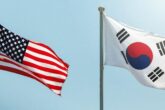September 30, 2015
Seoul's China Gambit
At the United Nations General Assembly on Monday, South Korea’s President Park Geun-hye called on the international community to turn its attention to North Korea and its nuclear ambitions, calling the Hermit Kingdom the world’s “last remaining nonproliferation challenge.”
North Korea remains by far the chief preoccupation of Seoul’s national-security policy makers. Fully 70% of Pyongyang’s military—the world’s fourth largest—is forward deployed, most of it aimed at the South. It boasts the largest special-operations forces of any nation. After land mines injured two South Korean soldiers in the demilitarized zone last month, tensions between the two Koreas escalated to a state of “semi-war,” and were only defused through bilateral talks.
Now Pyongyang has announced an imminent satellite launch expected to demonstrate its ballistic-missile capabilities. Armed with nuclear and chemical weapons, Kim Jong Unposes an enduring threat to the South.
This has motivated South Korea and China recently to develop warmer ties, something that hasn’t gone unnoticed across the region. Most observers understand this development as the result of a shared grievance against Japan, and see Beijing as trying to drive a wedge between Seoul and Tokyo. That may be the case, but the deeper explanation is found not by looking at Tokyo but at Pyongyang. Sensing a unique opportunity on the peninsula, Seoul has a China gambit of its own.
China, for its part, has begun to tire of Pyongyang’s erratic behavior. And while Beijing has by no means started to cut its decades-long support for North Korea, it has started to welcome ties with the South.
The diplomatic chasm could hardly be starker. China’s President Xi Jinping last year bypassed Pyongyang and instead visited Seoul. He has met a total of six times with President Park, but not once with Kim. At the military parade earlier this month commemorating the 70th anniversary of Japan’s wartime defeat, Ms. Park was a featured guest, while North Korea was only represented by a lower-ranking official who met with none of his Chinese counterparts and spent less than 24 hours in the country. Kim has reportedly refrained even from meeting with Beijing’s ambassador in Pyongyang.
Beyond the diplomatic snubs, Chinese officials seem to worry that Kim’s provocations will induce a greater regional security role for the U.S., possibly with a larger naval presence or more sophisticated missile defenses.
Here Seoul senses an opportunity. For years frustrated by China’s continued support for the North, South Korean officials now hope to bring Beijing on board with their vision for unification and enlist Chinese support for denuclearization.
Whether that’s possible remains to be seen. So far Beijing has given little indication whether it will change its approach to Pyongyang. The South’s overtures are premised more on hope than concrete achievements.
But they certainly enjoy support at home. Buoyed by a shared sense that Japan has been insufficiently sincere in its apologies for its wartime behavior, South Korean officials speak of China in tones significantly warmer than is typical of an American ally. The two countries also share deep economic linkages—South Korea’s trade with China is now greater than its combined trade with the U.S. and Japan.
But closer ties with Beijing could complicate U.S.-Seoul relations. South Korean policy makers fully understand that their moves take place in the context of a highly competitive U.S.-China relationship, but they ask for the diplomatic space to test whether they can induce a slight shift in China’s policy. They believe their efforts reflect not a broader geopolitical realignment or a step away from the U.S. alliance, but a narrower diplomatic effort.
This balancing act will be tricky, with one potential impasse already in sight. Washington wants to explore the deployment in South Korea of the Terminal High-Altitude Area Defense (Thaad), an antiballistic missile system that would augment the coverage of existing Patriot-missile batteries in the region. China objects to a Thaad deployment, and thus far Seoul has been noncommittal.
Washington may well be willing to grant the diplomatic space Seoul desires, provided that Beijing begins to make concrete changes to its North Korea policy. The impending satellite launch will mark an early test. Seoul will likely respond by taking the matter to the U.N. Security Council, where it will seek tough action by the permanent members. U.S. support is all but guaranteed. How Beijing responds will provide one indication of whether Seoul’s big bet can pay off.
More from CNAS
-
Trump-Lee Summit
Duyeon Kim, adjunct senior fellow at the Center for a New American Security joins CNN to discuss the Trump-Lee Summit and the concerns should U.S. troops pivot to focus on Chi...
By Dr. Duyeon Kim
-
Upcoming Trump-Lee Summit: Modernizing the Alliance by First Reaffirming Long-Standing Principles
Trump and Lee could reaffirm their country’s commitment to the alliance amid shifting security dynamics and agree to modernize it in broad terms to meet the needs of today and...
By Dr. Duyeon Kim
-
South Korea-U.S. Launch Ulchi Drills as Kim Slams Exercise as “Hostile”
With North Korea's growing alignment with Moscow, plus renewed great-power diplomacy following President Trump's latest call with President Putin, the Korean Peninsula is once...
By Dr. Go Myong-Hyun
-
Indo-Pacific Security / Energy, Economics & Security
75 Years Post-Korean War: Can Trust Be Rebuilt Under the New Administration?As President Lee Jae Myung begins his term, he's taking visible steps to reset the tone with North Korea: halting propaganda broadcasts and reemphasizing past military agreeme...
By Dr. Go Myong-Hyun



